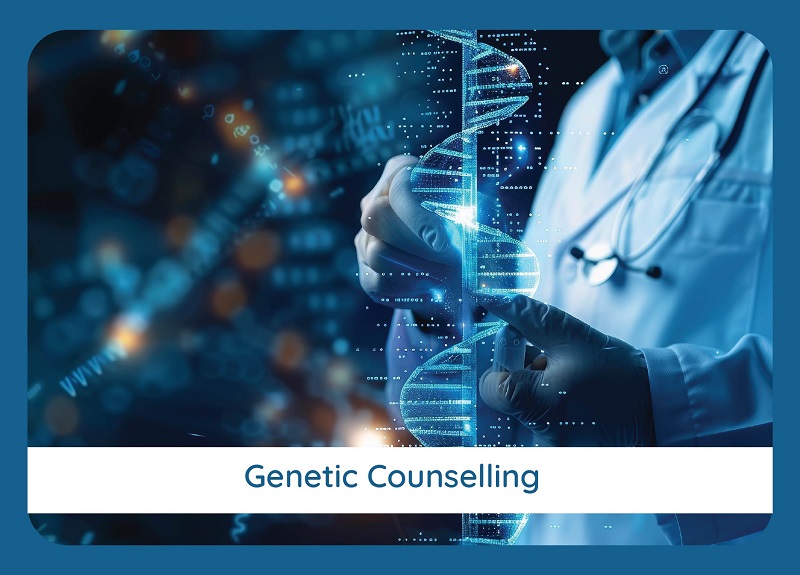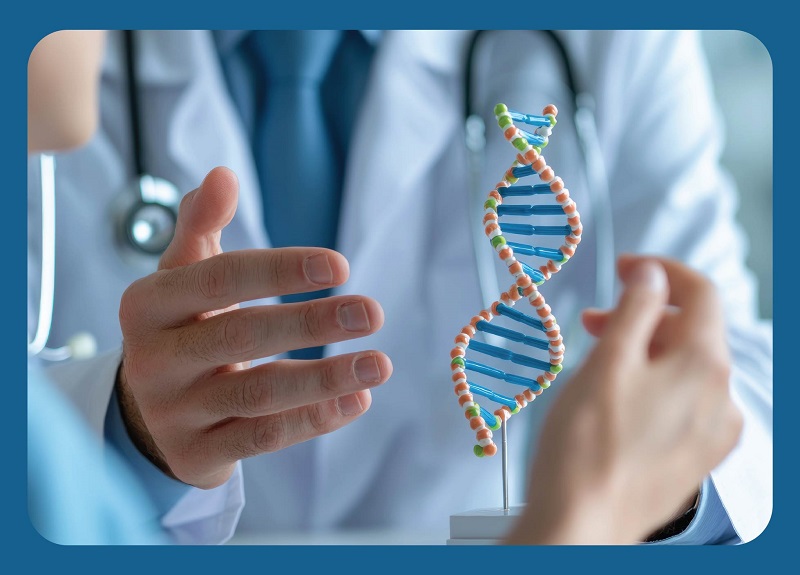
Introduction to Genetic Counselling
Genetic counselling is a health service that provides individuals and families with information and support about genetic conditions. It helps people understand how genetic conditions might affect them or their children and offers guidance in making informed decisions about genetic testing and managing health risks. This process is led by trained healthcare professionals known as genetic counsellors, who specialize in medical genetics and counselling.
What Is Genetics and Why It Matters?
Genetics is the study of genes, which are the basic units of heredity passed from parents to children. Our genes determine many things about us - such as eye colour, blood type, and risk of certain disease. Some genetics changes, or mutation, can lead to health problems or increase the risk of developing certain conditions like cancer, heart disease, or inherited disorders.
Everyone inherits two copies of each gene - one from each parent. If there is a harmful change in one or both copies, it can affect the way the body works. Sometimes, these genetic changes are passed from one generation to the next; other times, they happen randomly and are not inherited.
What Is Genetic Counselling?
Genetic counselling is a communication process. It involves collecting detailed personal and family medical histories, assessing the risk of inherited conditions, explaining genetic concepts, and discussing possible testing options. The aim is to help individuals and families understand and adapt to the medical, psychological, and familial implications of genetic contributions to disease.
Who Should Consider Genetic Counselling?
Genetic counselling can be helpful for many individuals and families, especially in the following situations:
Personal or family history of a genetic condition: Such as breast or ovarian cancer, muscular dystrophy, or sickle cell anemia.
Multiple relatives with the same or related conditions: This could suggest an inherited pattern.
Pregnant women or couples planning to have children: Especially if there's a known genetic condition in the family or if advanced maternal age is a concern.
Children with birth defects, developmental delays, or learning disabilities: These might have a genetic cause.
People with abnormal results from genetic or prenatal screening tests: Counselling helps interpret the results and plan next steps.
Ethnic backgrounds with higher risk of certain genetic diseases: For example, Ashkenazi Jews, Mediterranean populations, or individuals of African descent may carry certain disease-related gene variants more frequently.
What Patients Can Expect During Genetic Counselling?
When you attend a genetic counselling session, here's what typically happens:
-
Pre-Counselling Preparation:
Patients are usually asked to gather family health history before their appointment. This includes information about medical conditions in close relatives (parents, siblings, grandparents, aunts, uncles, and cousins), ages of diagnosis, and causes of death if applicable. This helps the genetic counsellor assess inherited patterns. -
Initial Session:
In your first session, the counsellor will:Take a detailed medical and family history
Construct a family tree (pedigree) showing relationships and health conditions
Evaluate your risk of having or passing on a genetic condition
Provide education about relevant genetic conditions, how they are inherited, and the role of genes
Discuss testing options, their accuracy, limitations, and implications
Provide emotional support and help with decision-making

-
Genetic Testing (if chosen):
Genetic testing may be recommended based on your risk level. It can involve a blood, saliva, or cheek swab sample. The type of test will depend on the condition being evaluated. Results may take a few days to several weeks, depending on the complexity of the analysis.Mastectomy (removal of breasts)
Oophorectomy (removal of ovaries)
-
Follow-up Session:
Once test results are ready, a follow-up session is scheduled. During this visit, the counsellor will:Explain your test results in understandable language
Discuss what the results mean for you and your family
Guide you on next steps—whether it's surveillance, treatment, or informing other family members
Offer psychological support for any emotional impact of the results
Types of Genetic Tests:
Diagnostic Testing: Used to confirm or rule out a suspected genetic condition in a symptomatic individual.
Predictive or Pre-symptomatic Testing: For healthy individuals with a family history of a genetic disorder (e.g., Huntington's disease).
Carrier Testing: Determines if an individual carries a gene mutation that could be passed to children.
Prenatal Testing: Checks for genetic abnormalities in a fetus, typically done through procedures like amniocentesis or chorionic villus sampling (CVS).
Newborn Screening: Performed shortly after birth to identify certain genetic disorders early.
Pharmacogenetic Testing: Examines how a person's genes affect their response to medications.
Benefits of Genetic Counselling:
Informed Decision-Making: Understand the risks, benefits, and limitations of genetic testing.
Early Detection and Prevention: Identify health risks and implement early monitoring or preventive strategies.
Reproductive Planning: Learn about reproductive options, such as IVF with genetic screening or use of donor gametes.
Personalized Medical Care: Tailor treatments and healthcare plans based on genetic information
Emotional Support: Receive psychological guidance during potentially stressful decision-making processes.
Emotional and Ethical Considerations:
Learning about genetic risks can be emotionally challenging. People may experience anxiety, guilt, confusion, or fear of discrimination. Genetic counsellors are trained to help you process these emotions and make decisions that align with your values and circumstances. Privacy and confidentiality are core principles of genetic counselling, and your information is protected.
Challenges and Limitations:
While genetic counselling offers many benefits, it also has limitations:
Uncertain Results: Sometimes, a variant of unknown significance (VUS) is found, making interpretation difficult.
No Cure for Certain Conditions: Even with a diagnosis, treatment options may be limited.
Emotional Impact: Knowing one's genetic risks can lead to psychological stress.
Family Dynamics: Sharing genetic information with family members may create tension or anxiety
Cost and Access: Testing and counselling may not always be covered by insurance or accessible in all regions.
Future of Genetic Counselling:
As genetic technologies advance, genetic counselling is becoming more important. Innovations like whole-genome sequencing, polygenic risk scores, and direct-to-consumer genetic tests are rapidly changing the landscape. Counsellors will continue to play a vital role in helping people navigate these new frontiers ethically and effectively.
Genetic counselling is a vital service that empowers individuals and families with knowledge about their genetic health. Whether you're concerned about a family history of disease, planning a family, or facing a recent diagnosis, genetic counselling provides a supportive and informative environment to make confident, informed choices. The process respects your values, helps you manage emotional stress, and connects you with resources for care and support.
